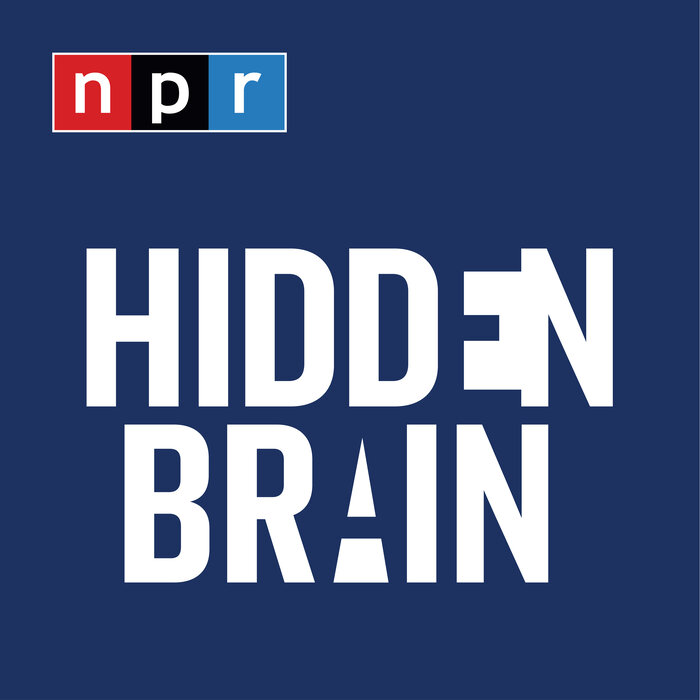
SHARED
LEARNING
This collection of resources reflects my journey of learning. From podcasts, to books, to visual media, this page contains an array of content relevant to the topics and events of today.

NPR: Hidden Brain
Podcast
Communications
September 4, 2017
Hiding Behind Free Speech
The United States goes further than many other countries in its legal protections for speech — even hate-filled speech. Some people have used free speech claims, for example, to defend the white nationalists and neo-Nazis who took to the streets of Charlottesville, Virginia several weeks ago.
In this episode, we look more closely at how people use free speech defenses, and why their true motivations might not be apparent — even to them.

NPR: Hidden Brain
Podcast
Psychology
December 25, 2017
I'm Right, You're Wrong
There are some topics about which it seems no amount of data will change people's minds: things like climate change, or restrictions on gun ownership. Neuroscientist Tali Sharot says that's actually for good reason. As a general rule, she says, it's better to stick to your beliefs and disregard new information that contradicts them. But this also means it's very difficult to change false beliefs. In this favorite episode from earlier this year, we look at how we process information, and why it's so hard to change our views.

Book
Books
Criminal Justice
August 18, 2015
Just Mercy
Bryan Stevenson was a young lawyer when he founded the Equal Justice Initiative, a legal practice dedicated to defending those most desperate and in need: the poor, the wrongly condemned, and women and children trapped in the farthest reaches of our criminal justice system. One of his first cases was that of Walter McMillian, a young man who was sentenced to die for a notorious murder he insisted he didn’t commit. The case drew Bryan into a tangle of conspiracy, political machination, and legal brinksmanship—and transformed his understanding of mercy and justice forever.
Just Mercy is at once an unforgettable account of an idealistic, gifted young lawyer’s coming of age, a moving window into the lives of those he has defended, and an inspiring argument for compassion in the pursuit of true justice. (Amazon)

NPR: Throughline
Podcast
Criminal Justice
August 15, 2019
Mass Incarceration
The United States imprisons more people than any other country in the world, and a disproportionate number of those prisoners are Black. What are the origins of the U.S. criminal justice system and how did racism shape it? From the creation of the first penitentiaries in the 1800s, to the "tough-on-crime" prosecutors of the 1990s, how America created a culture of mass incarceration. (NPR)

NPR: Throughline
Podcast
Civil Rights
July 15, 2019
Miliken v. Bradley
After the landmark decision in Brown v. Board of Education, public schools across the country were supposed to become more integrated, but by the 1970s, many weren't. As a way to remedy segregation in their city, the Detroit school board introduced busing across Detroit. But the plan was met with so much resistance that the issue eventually led all the way to the Supreme Court.
This week, segregation in Detroit public schools and the impact of a Supreme Court case that went far beyond that city. (NPR)

Psychology Today
Articles
Psychology
June 22, 2019
Moral Outrage: Why We Attack Each Other
Author: Rob Henderson
Outrage culture satisfies our urge for social solidarity.
Groups have social incentives to be outraged– expressing anger shows your commitment to the values of your community. And media companies have financial incentives to rile people up– playing on your anger means more clicks and shares.
Rather than allowing momentary outrage to hijack our attention, we can be more thoughtful about which threats to focus on and how to stop them. We long for conflict. But we can be more vigilant about how we satisfy this desire.

NPR: Throughline
Podcast
Sports Activism
February 19, 2019
On the Shoulders of Giants
When Colin Kaepernick stopped standing for the national anthem at NFL games it sparked a nationwide conversation about patriotism and police brutality. Black athletes using their platform to protest injustice has long been a tradition in American history. In this episode we explore three stories of protest that are rarely told but essential to understanding the current debate: the heavyweight boxer Jack Johnson, the sprinter Wilma Rudolph, and the basketball player Mahmoud Abdul-Rauf. (NPR)

NPR: Hidden Brain
Podcast
Politics, Psychology
May 18, 2020
Our Better Angels
Sam Bowles, a behavioral economist and author of The Moral Economy: Why Good Incentives Are No Substitute for Good Citizens, says it's a mistake to focus on the bad, and to ignore the good in people.
"Self-interest in markets and in relations with government isn't going to be a good way to organize the future," says Bowles. "[COVID-19] tells us that we have to rely on other things — communities, neighborhoods, obligations we have to each other — which are not self-interested. That's what we're seeing is fundamentally getting people through this."
This week on Hidden Brain, we explore how laws written to govern the lawless end up changing the behavior of the lawful — for the worse. And we ask, what would happen if public policy was designed to care less about the man who sold his masks for a profit? What would happen if we put people like Erika at the center of our thinking instead?

